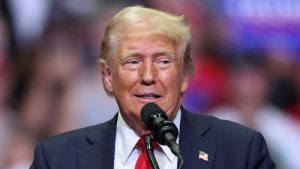Steve Mnuchin seeks AI partner to rebuild TikTok's algorithm in takeover bid: sources
Steve Mnuchin is angling to partner with an AI firm that can quickly rebuild TikToks algorithm as he looks to orchestrate a blockbuster bid to acquire the China-owned app, The Post has learned.
The former Treasury secretary first revealed last month that he was exploring a bid to buy TikTok after House lawmakers voted to pass a bill requiring its Beijing-based parent ByteDance to divest within six months or face a total US ban.
Now, insiders say Mnuchin is pitching a plan to rebuild TikToks algorithm in the US as the only likely way to satisfy Congressional concerns that the app poses a national security risk, as well as Chinas strict export laws that could block a sale.
The Senate is expected to hold hearings on the House bill later this year, although no vote has yet been scheduled.
Mnuchin believes that any effort to rebuild TikToks sophisticated algorithm would require a partner with access to advanced AI capabilities and expertise, the sources said. Given the size and complexity of the undertaking, the ex-Trump Cabinet member could partner with more than one tech firm, the sources added.
A spokesperson for Mnuchin declined to comment. TikTok did not return a request for comment.
Mnuchin has already said publicly that TikTok would need to be rebuilt in the US after an acquisition, arguing on CNBC that China will be fine selling it so long as theres not a technology transfer along the way.
Multiple experts told The Post that Oracle — the software giant headed by billionaire Trump donor Larry Ellison — is a logical candidate to join his bid. TikTok has already committed to storing the data of US users in servers operated by Oracle as part of “Project Texas,” a plan to satisfy national security and user privacy concerns.
Oracle did not return a request for comment.
When Mnuchin was Treasury secretary, Oracle nearly bought TikTok as part of the Trump administrations effort to force ByteDance to divest. Experts note that an Oracle deal wouldn’t likely to draw as much regulatory scrutiny as a deal with Big Tech firms like Google, Meta and Apple.
Oracle would make sense, given how involved theyve been in the history of this saga, according to Tobin Marcus, a former economic adviser to then-Vice President Biden during the Obama administration.
Microsoft, which is the chief investor in OpenAI, is another logical candidate. The Big Tech giant also came close to buying TikTok in 2020, with CEO Satya Nadella later remarking the aborted bid was the “strangest thing I’ve ever worked on.
Last month, the Washington Post reported that Mnuchin has told potential partners that he was in touch with Oracle as well as former Activision-Blizzard chief Bobby Kotick, who is also reportedly interested in buying the app.
A Kotick representative did not return a request for comment.
The app, which has more than 170 million American users, is sure to carry a hefty price tag. Bloomberg Intelligence estimated that its US business could be worth up to $40 billion, while others have put the price at $100 billion or beyond.
While some critics have blasted Mnuchin’s plan as far-fetched, rebuilding the algorithm is really the only option given Chinas strict export controls on AI, according to Andrew Grotto, the former senior director for cybersecurity policy under Presidents Barack Obama and Donald Trump.
Subscribe to our daily Business Report newsletter!
Please provide a valid email address.
By clicking above you agree to the Terms of Use and Privacy Policy.
Never miss a story.
I dont think its easy, but I also think given the right level of resource expenditure, the skys the limit in some sense, Grotto said. Whether the product is any good or not at least as good as the original underlying algorithm of TikTok, thats a different question. It seems like a minimally viable product is achievable.
Rob Atkinson, president of the Information Technology and Innovation Foundation think tank and a member of TikToks content and safety advisory council, agreed.
I dont know if its an irreplaceable algorithm, Atkinson said. It seems like with all the AI capabilities today, you could get a really good algorithm that would be maybe not 100% as good, but pretty good and over time would probably evolve to where it is today, if not better. So I dont think that would be the issue.
Rebuilding the app would be just one challenge for Mnuchins bid, which would need to secure approval from both the US and Chinese governments.
The road to the Senate floor is likely to be bumpy, according to Marcus, who views a vote as unlikely before the election. Calls for a ban swelled in March 2023 after TikTok CEO Shou Chews disastrous testimony on Capitol Hill, only to fizzle for more than a year, he noted.
The Senate certainly does not seem eager to just pick up the House bill and ram it through as-is, so theres definitely a possibility to make changes, Marcus said.
On the other side of the Pacific, critics say its a long shot for Mnuchin or any other potential buyer to secure the necessary approval from the Chinese government, which has repeatedly vowed to block any forced sale of TikTok.
One tech executive told The Post last month that a Beijing would see it as a huge besmirchment of their honor and integrity as a sovereign nation if the US government got its way.
Still, the Chinese government might find it difficult to turn down a huge market-value deal for TikToks US operations especially as its President Xi Jinping works overtime to reassure Western business leaders that the country is open for business.
I think theres a path for them signing off on it. I dont think Congress is bluffing, Atkinson said. You would diminish the value of a leading Chinese technology company by a significant amount. I think the Chinese government realizes they would be much better off if ByteDance can get a giant infusion of cash and use it to expand and do other things.
Critics also warn that delaying the sale-or-ban timeline for TikTok ensures that the Chinese Communist Party could use the app to meddle in the presidential election — one of the key reasons that lawmakers have pursued the legislation in the first place.
“The longer it remains under Beijings influence, the more control [Chinese President Xi Jinping] has over the news and information Americans under thirty-five consume and digest,” said Chris Fenton, a trustee at the US-Asia Institute. “Supporting a fair market sale to an American buyer as quickly as possible rewards investors, satisfies users, and protects national security interests.”
As The Post has reported, Senate Majority Leader Chuck Schumer (D-NY) is under pressure to hold a vote on the bill, which has drawn bipartisan support even as some lawmakers raise concerns that muzzling TikTok could violate the First Amendment or set a bad precedent on the targeting of specific companies via government legislation.
Senate lawmakers are reportedly debating potential changes to the bill including extending the six-month window or broadening its scope to target social media. Sen. Maria Cantwell (D-Wash.), who chairs the Senate Commerce Committee, reportedly wants to hold at least one public hearing before any potential vote.
Indeed, the House bills tight six-month divestment window is viewed as a major obstacle to the plan with 12 to 18 months seen as a more realistic timeline to close a deal that includes rebuilding a working version of the software, the sources added.
Prospective buyers are likely to seek an agreement that would allow TikTok to remain operational using its current software until the new algorithm is ready to be implemented even if that means exceeding the stipulated divestment window.
Cantwell has signaled she is in favr of an extended deadline, telling reporters it “would be a good component to guarantee success.”







